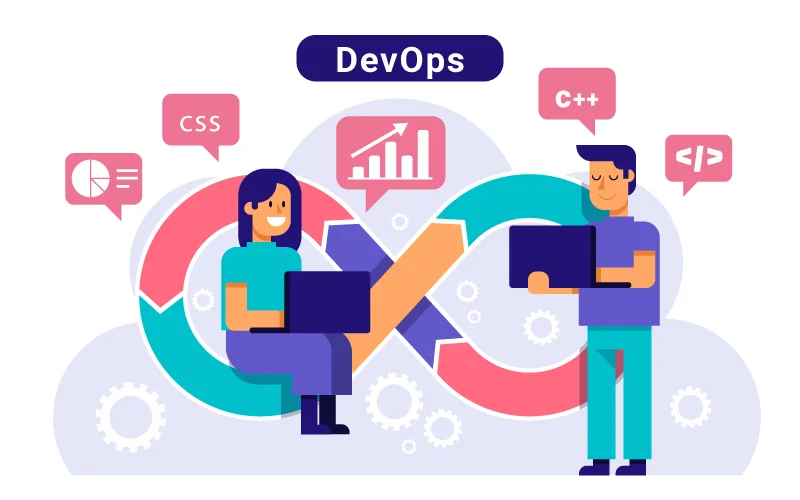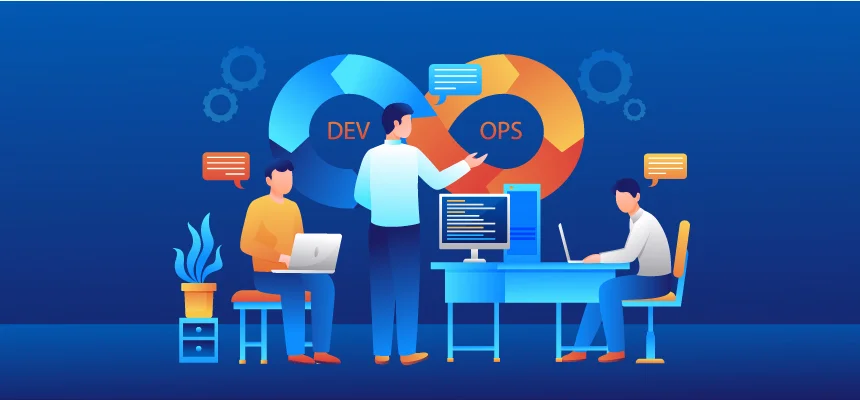In the fast-paced digital landscape, businesses aim for rapid delivery of high-quality software. DevOps, blending development and operations, is vital in achieving this. It streamlines the process, enhancing collaboration and efficiency and enabling faster software delivery. However, implementing DevOps practices comes with challenges. This article addresses the main hurdles encountered during DevOps implementation and provides practical solutions to overcome them. By tackling these challenges directly, organisations can successfully embrace DevOps and enjoy the numerous benefits it offers to their software development lifecycle.
What is DevOps?
DevOps serves as a comprehensive framework encompassing various practices that promote collaboration, communication, and integration among development, operations, and other stakeholders involved in software delivery. Its core principles revolve around automating processes, implementing continuous integration and continuous delivery (CI/CD), and fostering a culture of shared responsibility and accountability. By dismantling organisational silos and fostering cross-functional teamwork, DevOps empowers organisations to deliver software with greater efficiency, improved quality, and accelerated speed. This holistic approach streamlines workflows, minimises errors, and boosts overall productivity. Ultimately, DevOps enables teams to provide enhanced value to customers by aligning development and operations, resulting in improved business outcomes and customer satisfaction.
Why DevOps is Important
-
Faster Time to Market: DevOps accelerates software release, reducing time-to-market and granting organisations a competitive edge through faster deployment, enhanced efficiency, and improved customer satisfaction.
-
Enhanced Quality: DevOps utilises continuous integration and automated testing to detect and address issues early in development, ensuring software is delivered with higher quality and reliability.
-
Improved Collaboration: DevOps promotes effective communication and collaboration among development, operations, and other teams, dismantling silos and fostering a shared understanding of goals and objectives for improved synergy and efficiency.
-
Increased Efficiency: Automation of manual processes and the use of infrastructure as code (IaC) reduce human errors and increase efficiency, allowing teams to focus on value-added tasks.
-
Continuous Feedback: DevOps encourages a continuous feedback loop, enabling teams to gather insights from users and stakeholders, leading to iterative improvements.
How DevOps Improves the Software Development Lifecycle
DevOps practices bring numerous benefits to the software development lifecycle (SDLC), including:
-
Agile Development
DevOps aligns with agile through iterative development, collaborative practices, and frequent feedback loops, fostering efficient and adaptable software development processes. -
Continuous Integration (CI)
CI allows for frequent code integration into a shared repository, detecting integration issues early and ensuring smoother development workflows with multiple daily changes. -
Continuous Delivery (CD)
CD automates software deployment to production, ensuring changes are release-ready anytime. It streamlines the release process, improving efficiency and reducing the chance of manual errors.
 https://www.freepik.com/free-vector/flat-design-devops-illustration_25561022.htm#
https://www.freepik.com/free-vector/flat-design-devops-illustration_25561022.htm# -
Infrastructure as Code (IaC)
IaC provisions and manages infrastructure through code, ensuring consistent and reproducible environments. It enhances efficiency and scalability and facilitates infrastructure changes with ease. -
Continuous Monitoring
DevOps promotes the use of monitoring tools to gather insights into application performance, infrastructure health, and user experience, enabling proactive issue detection and resolution.
5 Key Challenges and Solutions in Implementing DevOps Practices
-
Cultural Resistance and Silos:
Challenge: Resistance to change and the existence of silos between teams can hinder the implementation of DevOps practices.
Solution: Foster a culture of collaboration and shared responsibility by:
-
Creating cross-functional teams: Bring together members from different teams to encourage collaboration and shared goals.
-
Promoting knowledge sharing: Encourage learning and knowledge exchange through training programs, workshops, and internal communication channels.
-
Celebrating successes: Recognise and reward individuals and teams that embrace DevOps practices, encouraging others to follow suit.
-
-
Toolchain Integration:
Challenge: Integrating various tools across the software delivery pipeline can be complex and time-consuming.
Solution: Adopt a toolchain strategy by:
-
Identifying the right tools: Evaluate and select tools that align with your organisation’s needs and integrate seamlessly with each other.
-
Automating toolchain integration: Utilise automation and orchestration tools to streamline the integration process, reducing manual effort and potential errors.
-
Ensuring scalability and flexibility: Choose tools that can scale as your organisation grows and adapt to changing requirements.
-
-
Legacy Systems and Infrastructure:
Challenge: Existing legacy systems and infrastructure can pose challenges when implementing DevOps practices due to their complexity and lack of automation.
Solution: Modernise and automate legacy systems by:
-
Identifying critical areas for improvement: Assess legacy systems to determine the most critical areas that need modernisation and automation.
-
Incremental migration: Adopt an incremental approach to modernise legacy systems, breaking them down into smaller, manageable components.
-
Implementing infrastructure as code: Leverage IaC tools to automate the provisioning and management of infrastructure, reducing manual effort and increasing consistency.
-
-
Security and Compliance:
Challenge: Ensuring security and compliance in a DevOps environment can be challenging due to the rapid pace of change and the involvement of multiple stakeholders.
Solution: Integrate security and compliance into the DevOps process by:
-
Implementing security as code: Embed security practices into the development process by using tools and frameworks that automate security.
-
Collaborating with security teams: Involve security teams early in the development process to address potential vulnerabilities and compliance requirements.
-
Continuous monitoring and auditing: Employ monitoring and auditing tools to identify security breaches and ensure compliance throughout the software delivery lifecycle.
-
-
Skills and Training:
Challenge: Lack of skills and training in DevOps practices can impede successful implementation.
Solution: Invest in skills development and training by:
-
Identifying skill gaps: Assess the existing skill set of your teams and identify areas where additional training is required.
-
Providing training opportunities: Offer training programs, workshops, and certifications to enhance the knowledge and skills of your teams in DevOps practices.
-
Encouraging continuous learning: Foster a learning culture by providing resources, encouraging participation in conferences and webinars, and promoting knowledge-sharing platforms.
-
Outline
The implementation of DevOps practices presents organisations with a unique set of challenges along the transformative journey. By addressing cultural resistance, integrating tools effectively, modernising legacy systems, ensuring security and compliance, and investing in skills development, organisations can overcome these challenges and unlock the true potential of DevOps. Embracing DevOps practices will result in faster delivery of high-quality software, improved collaboration, and increased efficiency, enabling organisations to stay competitive in the ever-evolving digital landscape. Stay up to date with the latest insights and updates on DevOps implementation by subscribing to Sanmark Solutions’ newsletter, providing valuable information and guidance for successful adoption.
Feature image source : https://www.freepik.com/free-vector/gradient-devops-illustration_25225459.htm#
